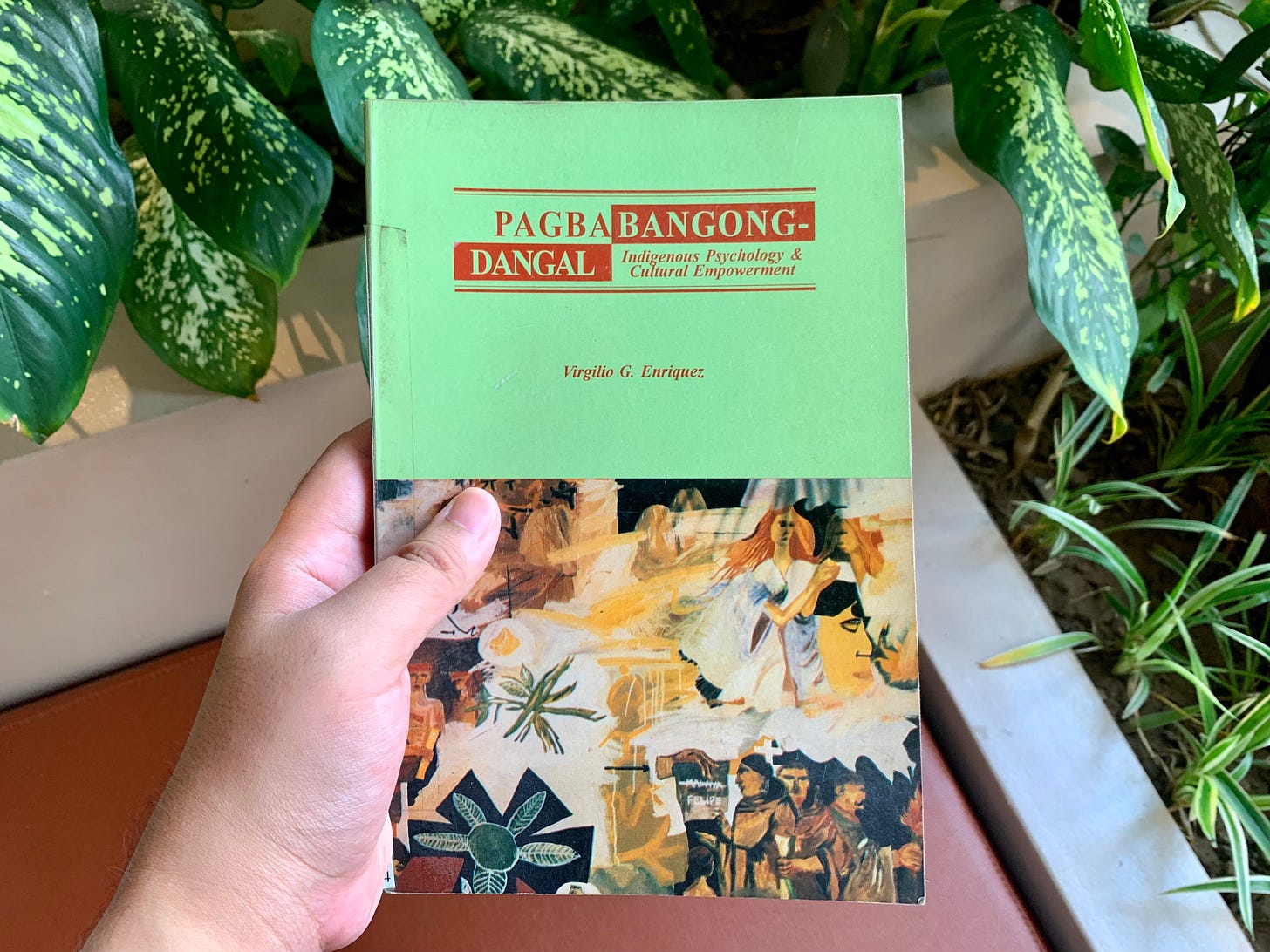Book Review: Virgilio Enriquez, "Pagbabagong Dangal"
Observations on cultural domination by the father of Sikolohiyang Pilipino
One morning, after giving a lecture, I went downstairs and found a huge pile of old books in the Lagmay Hall lobby. I asked the guard whether I could sift through the books. He told me to ask one of the faculty members who was in charge of it. So I did and I was told that the pile of books was actually a donation from Aklatang PSSP.1 It was supposed to be picked up by some community leaders, but apparently they just chose which ones to keep and left the rest. The faculty members teaching Sikolohiyang Pilipino had also picked out some books. “We don’t know what to do with those books now,” the professor told me, “so you can go ahead and take some home.” Excited, I began to dive into this pile of dusty books, getting paper cuts in the process. One of my students also joined me. By the end, I was able to get a few copies of out-of-print books on philosophy, parapsychology, and decolonization.
One of the great books I found was Pagbabagong-dangal: Indigenous Psychology and Cultural Empowerment, a book written in English by the Ama ng Sikolohiyang Pilipino (Father of Philippine psychology), Virgilio G. Enriquez.2 He was trained abroad, and when he returned, he worked with psychologist Alfredo Lagmay, then the chairman of the University of the Philippines psychology department, to embark on the study of the Philippine psyche.3 Pagbabagong-dangal is an easy read, under 100 pages long. It took me only a few hours to finish (if I wasn’t busy, it would’ve taken only a day), but I needed more time to absorb its lessons. Enriquez sadly passed away the same year it was published (which, incidentally was also the year I was born).
In the book, Enriquez called various perspectives that seem to approach indigenous psychology in a way that seems to present Filipinos as “exotic” to a Western audience. He also called out certain people who do so. It comes across as chismis (gossip), which made it such an engaging read. I hope this brief review allows folks to question their own approach to the indigenous Filipino consciousness, and encourages more people to engage with communities in a culturally-appropriate way.
Phases of Cultural Domination
There are six phases through which a culture is distorted, eradicated, or commercialized to suit a colonial worldview. The first phase, denial and withdrawal, deals with the suppression of important aspects of culture, such as its language, religion, or legal system. Then, through destruction and desecration, sacred manuscripts are burned and sacred spaces are occupied. Denigration and marginalization occurs when important expressions of culture (such as literature, values, and art) are set aside or treated as a “unique” category of global (that is, Westernized) culture. In redefinition and token utilization, certain practices (particularly spiritual traditions) are used in a way that seems to promote the idea that they are unconventional, primitive, or weird. Certain practices, therefore, are either used begrudgingly, if only to make the Western worldview more palatable to local sensibilities. This also happens in transformation and mainstreaming, where foreigners interpret local concepts through a colonial lens, thereby distorting these concepts or giving an unclear or incomplete picture devoid of context. Finally, as a surface-level acceptance of certain parts of culture happen through commercialization and commodification, which takes indigenous practices and tools and promotes them as a novelty. An example of this would be the inappropriate use of indigenous knowledge of certain plants native to the Philippines.
Decolonization, Counter-domination, and Empowerment
The way to empower indigenous culture and communities involves indigenous theorizing and empowerment, which promotes indigenous ways of knowing, bringing local frameworks to light and documenting these traditions by way of social interaction and story-telling. This is helpful in counter-domination through indigenous research methods. Here, the researcher approaches communities in a way that assumes a mutual respect. Research becomes a collaboration, with the researcher as a facilitator or a platform for voices from the community. Research encourages indigenous resistance to oppression, which de-centers local customs and beliefs. Resisting class and gender oppression is a natural outcome of this. And finally, as a product of community-led research, we are able to resist academic dependency, acknowledging that wisdom does not only come from published literature, but also from the people. All this honors the dignity of the Filipino, kahit saan, kahit kailan (forever, and wherever they may be).
Main Takeaway
This book is a manual in decolonizing for Filipinos, written in a time not unlike today. There are many surprising echoes from history that are still relevant in the internet age. So many Filipinos around the world are longing for home, called by their ancestral land, and social media allows for virtual access to it. We are able to connect with each other, strengthening that kapwa consciousness. We do not have to expect that indigenous psychology will become a kind of “universal” psychology, but we can hope that it contributes to our global understanding of the nuance and variety of being human.
Pambansang Samahan ng Sikolohiyang Pilipino, the national organization dedicated to the study of Philippine psychology. Aklatan means library.
Enriquez, V.G. (1994). Pagbabagong-dangal: Indigenous psychology & cultural empowerment. Akademya ng Kultura at Sikolohiyang Pilipino.
Pe-Pua, R. & Protacio-Marcelino, E. (2000). Sikolohiyang Pilipino (Filipino psychology): A legacy of Virgilio G. Enriquez. Asian Journal of Social Psychology, 3(1), 49-71.



